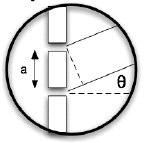 Physics
122 HW
Spring 2011
Physics
122 HW
Spring 2011
 Physics
122 HW
Spring 2011
Physics
122 HW
Spring 2011
![]()
Homework will be due at the beginning of lecture on Fridays.
No homework will be accepted after the solutions are released on BlackBoard (at about noon on the Friday when it is due -- but it will not be accepted after class if you skip lecture).
Please be certain to put your name and section number on every page and to NOT CONNECT THE PAGES with staples, clips, tape, or dogears. Connecting them may result in you homework being damaged or destroyed.
Homework
Assignment 00L (2 pts total)
(Due Friday, 1/28/11)
TO BE COLLECTED AND GRADED
For this week write a one to two page summary of what you have learned in 121. Much of 122 relies on what you learned there. Organize your summary in a way that makes sense to you and is convenient for thinking about what tools you have available. You will not get full credit for a free-form rambling paragraph. Set off and identify sections, basic principle, and relevant equations and diagrams. Please write your summary on the computer and print it out. If you do not know how to use the equation editor or it is not installed on your computer, you may write the equations and any diagrams that help you remember what you have learned in by hand.
NOT TO BE HANDED IN
The following problems are NOT TO HAND IN. These are a selection of problems from my 121 class and give an example of the kinds of problems we do and focus on the physics learned in 121 that will be used heavily this term. If you did not have my 121 I strongly suggest that you try these problems. The Course Center will be open (see scheduled times) for you to discuss them with others and to ask questions of me or the TA.
1. Testing the motion detector
2. Graph for a cart on a tilted airtrack -- with Spring
These do not show all the physics you need to know from the first semester, but they do recap the critical and fundamental principles from 121 and illustrate the kinds of problems we do in this class that may be somewhat non-traditional. Although the content is significant, what is more important is the kind of problems and the general skills you need to have to solve them -- such as translating graphs, or extracting relevant information from a complex physical description, or estimating quantitatively based on your physical experience. Other problems from my problem collection can be found at
![]()
| University of Maryland | Physics Department | Physics 122 Home |
|---|---|---|
 |
 |

|
Last revision 9. January, 2011.